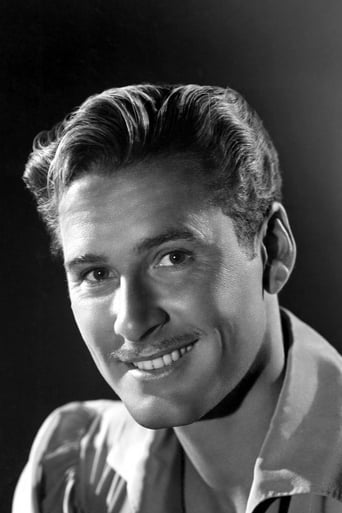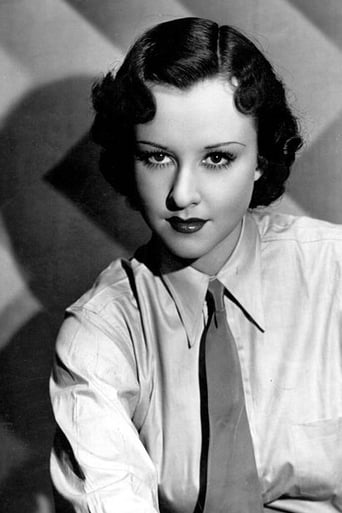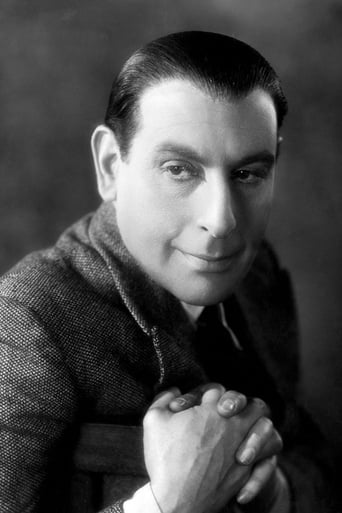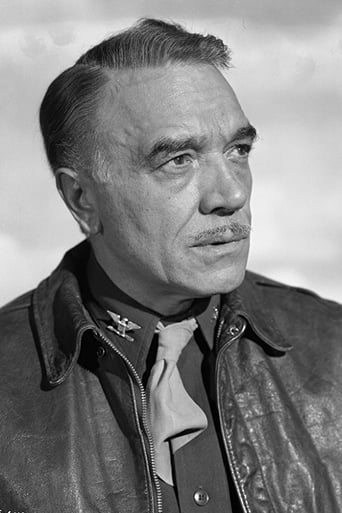Pluskylang
Great Film overall
Brendon Jones
It’s fine. It's literally the definition of a fine movie. You’ve seen it before, you know every beat and outcome before the characters even do. Only question is how much escapism you’re looking for.
Portia Hilton
Blistering performances.
Jakoba
True to its essence, the characters remain on the same line and manage to entertain the viewer, each highlighting their own distinctive qualities or touches.
JohnHowardReid
This one is marked for a disc-on-demand DVD release by Warner Brothers, though I don't think it will have many takers, aside from avid fans of Errol Flynn (whose co-stars, Anita Louise, Margaret Lindsay, Sir Cedric Hardwicke and Walter Abel don't exactly shine in the same kindly light). Adapted from the 1935 bestseller by Lloyd Douglas, the film could aptly be described as a Clayton's film noir, namely it's the film noir you have when you're not having a film noir. All the noirish elements are here – respected doctor who inadvertently murders a patient, idealistic colleague who takes the blame and not only sacrifices his own career, but is renounced by the murdered woman's daughter whom he had planned to marry – but they are handled in Douglas' usual disappointing lavender and lollipops style. Douglas can think up meaty, dramatic situations, but he handles them in a cop-out fashion and seems to go out of his way to avoid any real drama or suspense. He's an expert at pointing the finger, but failing to follow through. Instead, the heroic, self-sacrificing victim redeems himself not by telling the truth, but by expiating his nobility in some other fashion – in this case by allowing himself to be used a a guinea pig for an experimental vaccine that will supposedly counteract spotted fever. It does – in the book! It doesn't – in the movie! But our hero recovers anyway and is re-united with his ex-fiancée. Errol Flynn emerges creditably from this charade, whereas the girls are not only unable to disguise the rubbish that passes for dialogue, but are unflatteringly photographed to boot. In fact, Flynn is the only player who manages to emerge from Green Light with a degree of credibility. The other players, especially the young ladies in the drama, Anita Louise and Margaret Lindsay, are also unflatteringly photographed by Byron Haskin, and in addition to his shaky philosophy, Sir Cedric Hardwicke is further burdened with a ridiculous white wig.
Uconnmom
Taken in an historical context, the idea that Dr. Paige would take the blame for Dr. Endicott's failure was not "bizarre" at all, as other critiques assert. Self-sacrifice and the idea that suffering makes for growth of an individual were themes of the depression era. As to the viewpoint that Dean Harcourt is talking in some weird psycho-babble, at the time religious piety was declining and radio evangelism was emerging – talking about a higher power was more appealing than talking about God.I think Green Light has to be taken as entertainment, with good performances particularly by Errol Flynn, Margaret Lindsay, Walter Abel and Sir Cedric Hardwicke, and in the context of the times.
calvinnme
... the result is total confusion at best, and that best sums up how I felt watching this film. What saves it and makes it worth watching? First there's the cast, most of all the always charming Errol Flynn in a most unusual role along with the often overlooked Margaret Lindsay, feisty and loyal in her role here. Next there is Frank Borzage's direction. With his love of humanity shining through he makes something that seems weird taken plot point by plot point and makes it a warm enjoyable experience.Now for the confusing part - the entire plot. Errol Flynn plays a brilliant young surgeon, Dr. Newell Paige. Warm to everyone he meets, always with a smile, plus he likes dogs - his dog is a constant companion. The day comes for the operation of a prominent older woman in the community, Mrs. Dexter. The situation is urgent, but the surgeon that is to perform the operation is nowhere to be found (Henry O'Neill as Doctor Endicott). It turns out he's in a broker's office trying to save his portfolio from ruin. Paige starts the operation, but Endicott shows up in the middle and takes over. He cuts an artery too short for it to be clamped and Mrs. Dexter, dies. In private, Endicott admits his blame to Paige, but he refuses to blame himself when the hospital board brings up the whole matter at a hearing that is there for only one reason - to find someone to blame and fire for this incident. Paige doesn't show up at the hearing either, leaving the board to reach the conclusion that Paige is at fault and ask for his resignation - he gives it. Now, we're not talking about some 25 year old retail clerk covering for the mistake of a 60 year old retail clerk and taking the blame so the older less employable person won't be fired. We're talking about a trusted surgeon who made a fatal error because he was distracted. Do you think he's less distracted and therefore less dangerous the next time he's in the operating room with the guilt of the destruction of Paige's career on his conscience in addition to the worries over his personal finances? In spite of this obvious injustice, everyone in the know about what really happened digs their heels in about covering for Endicott even using "professional ethics" as an excuse. The only voice of reason here is Margaret Lindsay as Frances, Paige's nurse and obviously more than a little in love with him, but right just the same. She's about to blow the whole thing wide open when she's directed to Dean Harcourt, the minister that has counseled Paige and made him believe he was right to take the blame. Sir Cedric Hardwicke as the sublime old cleric is quite likable in his role, again owing to his own talent and probably to that of Frank Borzage, but if you listen to his words like you are reading a court transcript they are like so many fortune cookie sayings stitched together into some kind of psycho-babble. Worse, this minister seems to think it is a good idea to put people into embarrassing situations by introducing them to one another without them knowing the prominent part they play in each other's dilemmas. He does this to Mrs. Dexter's daughter (Phyllis played by Anita Louise) and Dr. Paige. They fall for one another. That is, until Phyllis finds out Dr. Paige was blamed for her mother's death, then she'll have nothing to do with him.How does Paige deal with this? He goes to the site of the North American plague of the time - Rocky Mountain Spotted Fever - where intense medical research is going on for a cure. He tests a vaccine on himself by injecting himself with the possible antidote and then deliberately allows himself to be bitten by a tick carrying the disease. If he lives, the antidote works. His reason? He somehow feels like he has to make amends and have his life - or death - mean something. What?? He is the guy who allowed himself to be unjustly accused and fired for something he didn't do, lost the girl he loved - Phyllis - to maintain the ruse, and he thinks he's anything but a prince of a guy? Then there's the whole matter of Frances, working side by side with Paige for years, beautiful, smart, and loyal, yet Paige skips over her entirely and falls for a girl he barely knows. In spite of what I've written here I really like this film and watch it periodically - it is a positive experience to watch a film full of characters with the best of intentions even if their reasoning skills are a bit off kilter. You really can't miss with Flynn starring and Borzage directing, but just don't expect for a minute to understand the motivations of any of the characters involved.
MartinHafer
This might just be the strangest Errol Flynn film other than the truly odd Cuban movies he made at the very end of his career. It has many strange plot elements and a convoluted religious element that just left me dazed! But, despite the very strange writing, the overall effort is still pretty good--mostly because it's hard to imagine Errol Flynn making a bad film! Heck, drunk and disinterested, he was still a heck of an actor--and here he is young and vigorous and engaging.The film begins with a strange Norman Vincent Peale sort of sermon by Cedric Hardwicke. In fact, whenever this odd preacher talks, he sounds very mystical...but never seems to mention God or the Bible! And you also wonder what the heck he has to do with the rest of the film. Well, honestly, he DOESN'T have much to do with the film--he seems more like a wacky social gospel-spouting plot device--but a pleasant one.The film actually has to do with a bizarre doctor (Flynn) who inexplicably covers for his boss when the boss-man botches an operation and kills a patient. I say inexplicable because his reasons for covering for the elder doctor seemed convoluted to say the least. As a result of taking the blame for something he DIDN'T do (and, by the way, possibly allowed an inept surgeon to keep practicing), agnostic Flynn goes to see Hardwicke--who pulls some strings and manipulates him into meeting the daughter of the woman (Anita Louise) killed by the other doctor. She falls for him but when she discovers that Flynn is the one blamed the death, she despises him and he runs off to a life of self-sacrifice working on Rocky Mountain Spotted Fever! This culminates with him injecting himself with an experimental vaccine--and Louis comes running to him! Does the amazingly self-sacrificing Flynn pull through?! Well, don't expect any surprises! If the plot I described sounds convoluted and weird, that's because it is--and it's actually a bit worse, but I omitted a bit of the plot due to space. The bottom line is that the film STILL manages to be enjoyable even though it is never the least bit believable. A very minor Flynn outing to say the least. At least it IS original!




